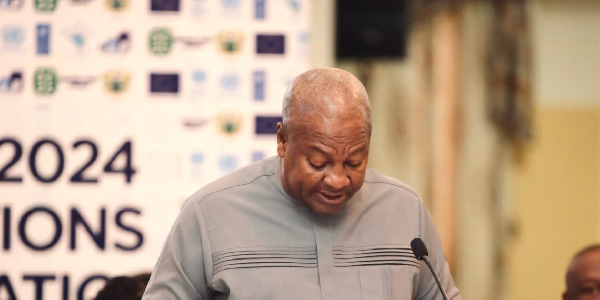President John Dramani Mahama has reiterated the critical importance of science education for students, urging them to embrace Science, Technology, Engineering, and Mathematics (STEM) for a brighter future.
He noted that STEM plays crucial role in Ghana’s socioeconomic development.
The President said this in his remarks at the opening of the African Academy of Sciences (AAS) high-level meeting of key stakeholders in Africa’s science-policy-practice nexus in Accra.
The two-day meeting being organised by the AAS in partnership with the Government of Ghana and the African Union (AU), African Scientific Research, Innovation Council (AU-ASRIC), and AfroChampions seeks to celebrate progress made towards achieving Africa’s Science, Technology, and Innovation (STI) Agenda while taking stock of opportunities, priorities, and imperatives for scientific cooperation with Africa.
President Mahama reiterated the need for the Government to start building more Science Technology, Engineering and Mathematics (STEM) secondary schools, adding that every secondary school should be a STEM school.
“And so, we don’t have to build stand-alone specialized STEM schools but to build STEM blocks and laboratories in every secondary school so that every child can have the same experience,” he said.
He said the presence of distinguished guests and participants at the high-level meeting of the African Research Initiative for Scientific Excellence was a powerful affirmation of their shared belief that science, research and innovation must be at the heart of Africa’s transformation.
The President lauded the African Academy of Sciences for the vision and partnership in convening the Accra Meeting.
He said since the founding of the Academy in 1985, it had distinguished itself as a non-political pan-African platform for scientific collaboration and knowledge production.
Adding that its mission was to transform lives through science and this resonates deeply with Ghana’s own development aspirations.
President Mahama paid tribute in honour of the legacy of pioneering African scientists and Ghanaian scholars who laid the foundation for scientific excellence in our region.
Among them were Professor Edward Ayensu, Prof Ebenezer Laing, Prof Daniel Adzei Bekoe, Prof Trebi Ollennu, Prof Robert Butler, Prof Francis Kofi Allotey and Dr Emmanuel Evans-Anfom.
The President said they remind them that Africa’s journey towards scientific leadership was rooted in their own agency creativity and resilience.
“The world today is shaped by knowledge economies. Nations that have prioritized science and technology have accelerated their growth, strengthened their resilience, and improved the quality of lives of our people,” President Mahama said.
“And that is why when we say that at independence, Ghana’s GDP (gross domestic product) was larger than that of Korea and others,” he added, saying, “the prioritisation of knowledge has made them accelerate far ahead of us. But let’s not give up. We’re going to catch up.”
President Mahama said innovation remains the most transformative driver of development, from food security to health care to energy to security to infrastructure to climate change adaptation.
He said whether in modern agriculture, in smart cities, in renewable energy, or genomic medicine, the future belongs to those who invest in knowledge and apply it wisely; stating that, that was why Ghana was proud to host ARISE.
He said the Accra meeting must inspire dialogue and ignite action, real coordination, and sustainable investment in science, research, and innovation.
The President said to strengthen the interface between science and economic development, the Ministry of Environment, Science, Technology, and Innovation, in collaboration with the Council for Scientific and Industrial Research (CSIR) had instituted an annual Scientific and Industrial Interface Review Forum.
This initiative, the President said would bring together Ghana’s leading scientists and research institutions and bring them together with captains of business and industry, with innovators and entrepreneurs.
He said the initiative would give them the opportunity to showcase the findings of their research, and this would help them identify commercial pathways and align national research outputs with the practical needs of business and industry.
The President said, he believed that sustained dialogue and cooperation between researchers and industrial actors would catalyze the uptake of locally developed technologies and processes and thereby enhance productivity and create jobs.
He said he believed that every school should take an excursion to CSIR and see what they were doing there.
President Mahama noted that a lot of research findings that they had made remain on the shelves because there was a gap between research and practicalizing and commercializing the findings of the research.
“And this is what we are trying to bridge, and that’s why we must bring these two people together. We don’t research just for the sake of research. You must research so that it makes a difference in people’s lives.”
On his part, former Nigerian President Olusegun Obasanjo urged African leaders, who were interested in space exploration, to for now prioritize the provision of the basic needs of their people; such as food security, health, and education.
“I believe that our knowledge, our science, our technology, our innovation should start with our stomach, food. If we can conquer our stomach and fill our stomach with what we produce, what we manufacture, what we process, we will be solving one important problem,” he said.
He said that when the people were well fed, space exploration would then follow in the future.


